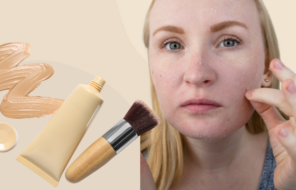Your skin’s structure is comprised of an intricate cell network that acts as a protective barrier. These include lipids (fatty molecules) known as ceramides. Ceramides occur naturally in the skin, but they’re also a key ingredient in moisturizers, face masks, and serums. Using ceramide-rich skincare products offers many perks, including boosting moisture levels and improving skin texture.
We chatted with Dr. Aanand Geria, a dermatologist in Verona, New Jersey, and Dr. Cameron Rokhsar, a dermatologist on Long Island, about how boosting your skin’s natural ceramide reserves with serums, cleansers, and moisturizers is a good idea. With help from our experts, we’ll outline how to incorporate ceramides into your skincare routine, plus any side effects to watch out for.
What are the benefits of ceramides?
Aging, genetics, and environmental stressors can cause your skin’s natural ceramide levels to drop. When this happens, your skin’s barrier function is weakened, leading to irritation, dryness, and other issues, according to Geria.
But ceramides may be the right solution. “Ceramides help to strengthen the skin’s barrier function by forming a protective layer that prevents the penetration of harmful substances such as allergens, pollutants, and irritants,” Geria said.
Using ceramide-rich skincare products can benefit many skin concerns. These include:
- Dryness. Ceramides help lock in moisture, which can be particularly helpful for dry skin.
- Eczema and other inflammatory skin conditions. Ceramides have anti-inflammatory properties that can calm irritated skin. This makes them beneficial for people with eczema and other inflammatory skin conditions like psoriasis.
- Aging. Our skin’s natural ceramide levels often decline as we age, contributing to wrinkles and lines. “By replenishing the skin’s ceramide levels, topical ceramide products can improve skin texture and reduce the appearance of wrinkles,” Geria said.
- Sensitivity. Your skin’s barrier plays a vital role in protecting against environmental irritants, allergens, and other potential sensitivity triggers. “Ceramides can help strengthen the skin’s barrier and reduce the risk of irritation,” Geria said.
How to use ceramides

1. Pick your product
You’ll find ceramides in moisturizers, serums, and face masks. The product you choose may depend on your skin concerns and preferences.
- Serum. “A serum that contains ceramides can be particularly beneficial for aging or sensitive skin,” Geria said. Apply a few drops of the serum to clean skin, then seal it in with a moisturizer.
- Moisturizer. A moisturizer containing ceramides can help hydrate and protect dry skin. Apply the moisturizer after using a cleanser and toner.
- Face mask. If your dry skin needs extra help, use a ceramide-infused face mask to further boost hydration. “Apply the mask once or twice a week after cleansing and toning your skin,” Geria suggested.
2. Apply twice daily
“In many cases, applying ceramides twice daily will be most beneficial for your skin,” Rokhsar said. He suggested applying the product immediately after a shower and again before bed to lock in extra moisture.
Using ceramides in the morning helps hydrate the skin and protect it from the environmental stressors you’ll face that day. Meanwhile, including ceramides in your evening skincare routine provides extra moisture and supports the skin’s natural repair process, according to Rokhsar.
3. Enhance the benefits of ceramides
Amplify the benefits of ceramides by pairing them with moisturizers, serums, or masks containing a form of vitamin B3 known as niacinamide. As Rokhsar noted, niacinamide is known for its brightening and acne-fighting properties. It also boosts hydration and calms redness. Like ceramides, you can use niacinamide once or twice daily.
At night, magnify the benefits of ceramides by using a toner with salicylic acid. “This ingredient can help treat pigmentation and even out skin tone,” Rokhsar said. Salicylic acid improves the appearance of the skin, while ceramides lock in moisture and prevent irritation.
Sunscreen is a must. “Sun damage can deplete the skin’s natural ceramide levels, so it’s important to use sunscreen every day to protect your skin,” Geria said. Look for a sunscreen that contains ceramides for an extra boost.
Do ceramides have any side effects?
Because ceramides occur naturally in the skin, they’re generally considered safe for topical use in skincare products. “When used as directed, there aren’t any known side effects of using ceramides in your skincare routine,” Geria said.
However, as with any skincare product, there’s always a risk that certain ingredients may cause irritation or allergic reactions — especially if you’ve had an allergic reaction to skincare products in the past. “If you experience signs of irritation after using a product that contains ceramides, discontinue use and contact a dermatologist,” Geria said.
The final word on ceramides
While ceramides occur naturally in the skin to strengthen barrier function, levels can quickly get depleted. When this happens, your skin can get dry and irritated. Using skincare products containing ceramides reinforces your skin’s barrier function, upping moisture levels and improving skin texture.
Ceramides are generally safe and effective. However, it’s always possible to have an allergic reaction, so stop using a product if you experience irritation.





